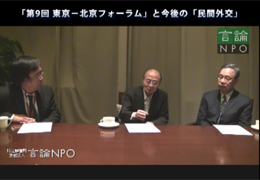
A recent annual dialogue between influential Japanese and Chinese figures came amid a tense atmosphere between Japan and China, but their discussions were a qualified success as they provided a clue to what must be done by the private sector when diplomatic relations are deadlocked, according to key Japanese participants.

In view of the latest two days of discussions at the 9th Tokyo-Beijing Forum, government people in the two countries appear to be interested in such a direction, he said. The meeting, held in Beijing on Oct. 26-27, questioned whether private-sector dialogue is truly effective to help facilitate intergovernmental talks on diplomatic issues, said Akashi, chairman of the Japanese Executive Committee of the forum.
In a three-way discussion after the conclusion of the meeting, Akashi stressed that questions are being asked as to whether Japan and China can display rational attitudes "based on a calm, long-term vision" toward repairing their relations.
Participants from both sides had hard discussions, mainly on a bilateral territorial dispute involving a group of islands in the East China Sea and discrepancies over the recognition of Japan's wartime acts, and some of them almost gave up a plan to adopt a concluding statement at one point. However, the two sides agreed to adopt what they call the "Beijing Consensus" summing up the results of their dialogue.

Some Chinese participants had been concerned that if the meeting was not convened this time, it would be difficult to revive it, said Yuji Miyamoto, a former Japanese ambassador to China. As the meeting was actually held, the importance of the forum as a channel for dialogue between the two countries was reconfirmed among Chinese people, he said.
The audience at the first-day session surpassed 600 people, mostly Chinese, Miyamoto said. "This was just epoch-making and wonderful," he added.
The three-way discussion was also joined by Yasushi Kudo, the representative of the Genron NPO, a non-profit Japanese think tank, who served as moderator.

Kudo, a key forum organizer on the Japanese side, said that the Beijing Consensus included various principles and ideas, such as mutual non-aggression, which must be honored between the two countries. These terms are only natural in a sense for the two countries' peoples, but these words are rarely uttered among people in the two countries, Kudo said. In this regard, the adoption of the joint document was of great significance, he said.
Diplomacy should be primarily performed by governments, but intergovernmental diplomacy is not properly functioning between Japan and China at present, Kudo said. Therefore, it must be questioned what can be done by the private sector to help facilitate intergovernmental diplomacy, he said.
While noting that private-sector people are rather "supporting players" in diplomacy, Akashi said that when government-to-government diplomacy has come to a standstill, the private sector should be more independent to play an important role to help resolve diplomatic problems from a longer-term point of view.
Recalling his 40 years of diplomatic service, Miyamoto said that the power of public opinion has become stronger than ever. A country's diplomatic policy is sometimes bound by the direction of public opinion, he said. Unless a country's public opinion goes in a favorable direction, it will be difficult to come up with an appropriate diplomatic policy, he said. The necessity for private-sector people to think independently is becoming even stronger than before, said Miyamoto, who serves as Akashi's deputy at the Japanese Executive Committee.
The Genron NPO, led by Kudo, has come up with what can be called "opinion-based diplomacy" as a brand-new idea as to what a new private-sector diplomacy should be. When intergovernmental diplomatic relations are deadlocked, public opinion should display its power to help improve the situation, said Kudo. But this must be "healthy public opinion" as an involved entity, rather than shallow, emotional opinion, Kudo said.
The proposed opinion-based diplomacy should not be selfish, but it must be supported by many people, he said. "This will help strengthen Japan's public opinion, thereby reinforcing Japan's diplomatic capability," said Kudo.
According to a series of recent opinion surveys in Japan and China, about 90 percent of respondents on both sides had adverse feelings toward each other's country, but at the same time, about 70 percent of them recognized the importance of Japan-China relations, Akashi noted. These findings indicate that there exists not just emotional public opinion but also calm opinions among people in both countries, he said.
If the weight of such calm opinions gradually increases, the two governments may be encouraged to push their diplomatic efforts, he said. Such a favorable interaction, if realized, will be epoch-making, and this is feasible, Akashi said.
People's opinions represent the foundation of democracy, Miyamoto said. Tokyo-Beijing Forum participants should be theoretical in further refining their arguments, as a lot of people watch their discussions, making them more aware of their positions as figures involved. Actually, many questions and ideas were presented from the floor at the latest meeting, Miyamoto said.
People on the floor and panelists alike came up on the same stage and had discussions from the same perspective, and this was quite different from the previous dialogues, he said.
Miyamoto also said that Japanese and Chinese participants still lack proper understanding of each other's position on the outstanding problems between the two countries. Both sides tend to stereotype each other as they like and continue endless criticisms of each other, he said. "Unfortunately, this illustrated the depth of differences in mutual understanding," he said. "This also reminded us that the differences should be narrowed to start a constructive discussion with a life-size image of each other to be painted," said.
Post a comment